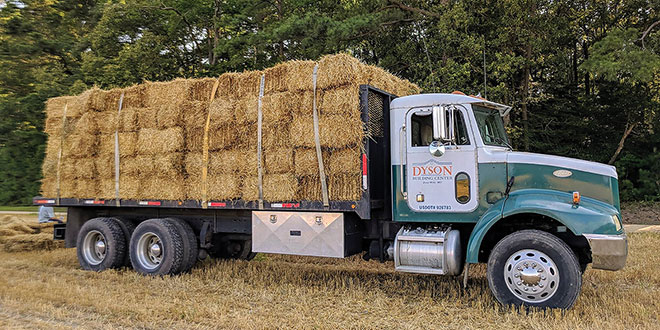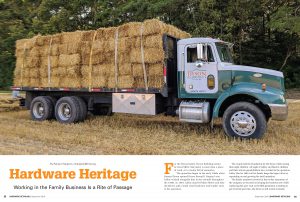
Click the picture to download a PDF of this story.
By Renee Changnon, rchangnon@nrha.org
Hardware Heritage
For the Dyson family, Dyson Building Center in Great Mills, Maryland, is more than a place of work—it’s a home full of memories.
The operation began in the early 1900s when Sammy Dyson opened Dyson Sawmill. Sammy’s son LeRoy worked alongside him in the sawmill throughout the 1940s. In 1954, LeRoy married Marie Meise and they decided to add a small retail hardware and lumber store to the operation.
The couple laid the foundation for the future while raising their eight children. All eight of LeRoy and Marie’s children and their sixteen grandchildren have worked in the operation. LeRoy died in 1982, but his family keeps his legacy alive by expanding on and growing his retail operation.
The family members invested in day-to-day operations of the company are focused on keeping the business new while embracing the past. And as the fifth-generation is starting to get involved part time, the future is still rooted in family.
Learning the Retail Business
Dyson’s Mill was considered the longest continuously operating sawmills in Great Mills, a town named in honor of the many mills that once occupied it, says Neal Dyson, a fourth-generation family member in the business.
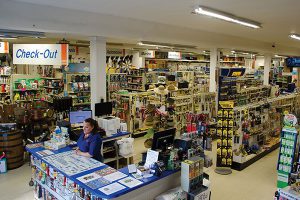
In the 1940s, the Dyson family expanded the mill. What was once a traveling operation came to rest on the site Dyson Building Center occupies today.
When LeRoy and Marie opened the hardware store in 1954, it was about 1,000 square feet, but as business grew, the family expanded the store. As they shifted to focus on retail, they gradually phased out the sawmill business, and by the 1970s, the mill closed, says Virginia “Vi” Dyson Guzman, third-generation owner.
“Dad wasn’t able to run the store, manage the sawmill and do fillings,” Vi says. “It just became too much, and that’s why he decided to close it to focus on hardware and building materials.”
Two of LeRoy and Marie’s children knew they wanted to make a career in the family business.
Vi joined the family business after graduating high school. She began helping her mother in the office and spent time working alongside her father at the counter. J.C. Dyson, the fourth child in line, started helping his father in his early teens, learning the business from the ground up. He is now the president of the company.
In the late 1970s, the store underwent its first expansion, going from 1,000 square feet to 5,000 square feet.
In 1987, the business incorporated and another store renovation brought it to 12,000 square feet. The store took on the trade name of Dyson Building Center to show the wide array of products available. At that time, the company computerized operations.
All of LeRoy and Marie’s 16 grandchildren have had some level of experience working or spending time in the hardware store, with many memories wrapped up in the hard work and fun experienced in the building that grew alongside the growing family.
“As I walk through the store today, it’s like I’m walking back in time to when I was eight years old in my grandparents’ hardware store,” Neal says. “Now I’m almost 40 years old. Spending so much time here with my extended family and learning about hard work and the importance of family are lessons that have helped me become the man I am today.”
One Big, Happy Family
Customers at Dyson Building Center are either waited on by a descendant of LeRoy and Marie or one of the many loyal, long-term employees.
Dyson family members comprise about a quarter of the business’s 20 employees, but the rest are practically family.
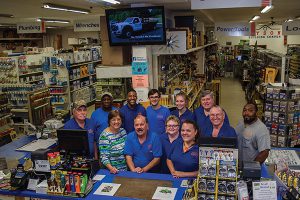
“There are people who have worked here for 20 or 30 years, so they’ve seen the kids in the family grow up,” Neal says. “I consider them my aunts and uncles. We are all one big family, attending every wedding and birthday. The customers we serve are an extension of our family as well.”
To this day, many regular customers come to the store on a near daily basis, where they’ll grab a complimentary cup of coffee and talk to their friends about the weather and the latest news in the community.
“I like to compare Dyson Building Center to the bar in the show ‘Cheers,’” Neal says. “People come here, and it’s true, everybody knows your name.”
While most of the memories working at the business bring up happy times, the third- and fourth-generation family members all can look back and laugh about gathering and collecting thousands of bales of straw, says Sandy Dyson, office manager for the business and J.C.’s wife.
“Our children spent a lot of time at the store growing up because we all worked here,” Sandy says. “If something around the store needed to be done, they came and helped. One thing everyone in the family has done at least once is collect straw bales from the farm fields in the summer. Even people not officially employed here have helped get the job done.”
According to Sandy, farmers in the area grow wheat, and once it gets to a certain point, the combine cuts the top of wheat off and the byproduct of the wheat is straw. Another tractor comes along to bale the loose straw. Because moisture isn’t good for the bales, the straw needs to be very dry before it is baled.
Family members and employees will go through the field with the farmer and gather the straw bales to throw onto the bed of the truck. Each year, they collect over 1,000 bales of straw. They sell it mostly for covering lawns after they have been seeded.
“It isn’t necessarily a fun task,” Sandy says. “It is always the hottest days of the year when it is time to bale it and load it on the trucks. In many ways, though, it’s a rite of passage. As a Dyson, we like to joke that you were ‘voluntold’ for the task.”
With the third- and fourth-generation family members working together closely in the business, Vi says the retail operation continues to evolve.
“The hardest thing as you age is to face changes because it’s easier to stick with what you know,” Vi says. “We’re lucky because we have family members like Melanie Dyson, who is in her 20s, and then those like myself in my early 60s, working together. We do a great job bringing all our ideas to the table.”
SpongeBob and Solar Panels
The team at Dyson Building Center is always looking for ways to distinguish the business from the competition.
The store has traditional hardware departments, with paint, tools, fasteners and a lumberyard, yet their offerings have expanded to include items like marine supplies, workwear, toys, bird feeders and even bags of sawdust.
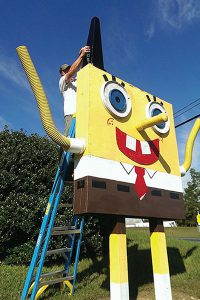
Dyson Building Center is located on a peninsula of southern Maryland and a river bisects the county, with 400 miles of shoreline.
“We’re very close to Washington, D.C., about an hour drive away, but because of the water, it’s remained a rural community with a small-town feel,” Neal says. “Our customers range from government contractors and Amish neighbors to weekend visitors, like journalist Ted Koppel.
We have such a cool, unique customer base.”To attract customers, Melanie says they are always open to trying new initiatives. “This year, we bought an ad that ran in the movie theater during the free summertime movies for kids,” Melanie says. “That ad is 60 feet wide in all theaters at every showing, and we’ve definitely noticed an increase in traffic.”
One of the many things customers associate with Dyson Building Center is a giant figure of the cartoon character, SpongeBob SquarePants. In many ways, it has become a landmark in the county, Melanie says.
“My dad wanted to build something on the hill by the store one year during Halloween. My sister and I watched ‘SpongeBob SquarePants’ with him all the time, so he decided to build SpongeBob.
He built him out of straw, and it was so popular he made a permanent statue in 1999,” Melanie says. “A few years ago, we had to take SpongeBob down to renovate him. We got so many calls from people worried we were removing him. People come and take pictures next to him, and we have fun with it, even dressing him up for the holidays.”
In 2015, the family invested in solar panels to produce energy for the store. Because no other businesses in the community had installed solar panels, the family did a lot of research to determine if solar energy was the right move for their store, Neal says.
“We got our roof repaired and in the process, added solar panels, keeping in mind our future endeavors of installing enough to add lighting in the lumberyard and parking lot,” Neal says. “We added 273 solar panels. On sunny days, we even overproduce the energy we need.”
Most recently, Vi’s 15-year-old granddaughter has stepped into the operation part time, and according to Melanie, the younger kids who are the fifth generation enjoy being in the store, just as she and Neal did when they were younger.
At the end of the day, the family credits both their loyal and new customers for their success, Sandy says.
“Our customers are loyal and supportive,” Sandy says. “When new customers come and check us out, most of them become regulars because they like the atmosphere and service.”
 Hardware Retailing The Industry's Source for Insights and Information
Hardware Retailing The Industry's Source for Insights and Information



